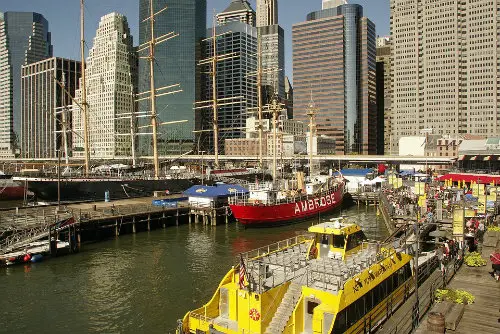If you’ve recently been injured while in service of a vessel based in a New York port, you may have several questions:
Our maritime lawyers can help answer your questions in a free consultation
With the Port of New York and New Jersey as its centerpiece, the state of New York is a global leader in the sea-based transportation of goods, passengers, and cargo.
There are 27 different ports throughout the state’s various waterways, with over 7,000 employees the Port Authority of New York alone and thousands more scattered throughout the state. These ports, harbors, docks, and other maritime settings allow countless Americans to provide for their families along with the rest of the nation through billions of dollars in traded goods.
While the economic merits of maritime work are clear, these employees face a variety of daily risks, which often lead to serious maritime and offshore injuries.
In many cases, maritime workers are injured in preventable accidents which occurred due to the negligence of their employer, a co-worker, or the owner of an unseaworthy vessel. When this happens, it’s important that these workers and their families don’t have to worry about meeting their financial obligations.
Talk to one of our Jones Act attorneys today to learn more.


Depending on the nature of your work duties as a maritime employee, you may be covered under either the Jones Act or the Longshore and Harbor Workers’ Compensation Act. A maritime lawyer can help you better understand your options.
If you spend most of your work time in the service of a vessel afloat on navigable waters, you’re likely covered under the Jones Act. In order to qualify, you must meet the Act’s definition of a seaman – which requires you to spend at least 30% of your work time in the service of an eligible vessel. In addition to no-fault compensation for necessary living expenses and medical wages, workers under this Act have the option to file lawsuits if some form of negligence contributed to their injury.
Ship crew members, offshore oil rig workers, and cruise ship employees are examples of employees covered under this Act. Determining if you qualify may require a legal review of your work duties and the circumstances of your injury.
All other maritime workers who don’t fall under the Jones Act are eligible to file a claim under the LHWCA. This generally applies to workers who spend most of their time near the water on ports, harbors, docks, and similar settings. Unlike the Jones Act, the LHWCA does not consider how negligence may have contributed to your injury. Instead, you’re entitled to no-fault benefits similar to what you’d recover in a land-based workers’ compensation claim, including medical expenses and compensation for lost wages.
New York’s largest ports are a driving force for the national and global economy.
The Port of New York and New Jersey is the busiest port on the East Coast, and the third busiest in the nation. Over $200 billion worth of cargo moves through the port’s numerous waterways each year. Various terminals are covered under the port’s district, stretching from Newark to terminals in all five boroughs, Westchester, and other counties throughout New York and New Jersey.
Situated on the Hudson River, the Port of Albany imports and exports a variety of goods through the Atlantic Ocean. This port is made up of various deep-water facilities, wharves, terminals and other maritime workplaces. Workers at these ports specialize in handling heavy-lift, projection, and dimensional cargoes. Because of high-quality food storage facilities on site, the Port handles a variety of grains, cocoa beans, and salt.
The Port of Buffalo is on the northeastern shore of Lake Erie, where the Niagara River meets western New York State. The port specializes in passenger transportation into southern Canada and throughout the northeastern United States. The Port also contains thousands of square meters of warehouse and distribution space for the storage of various cargoes.
Applying for financial compensation after a maritime work injury can be confusing. You may be unsure whether you qualify under the Jones Act or the LHWCA, or unsure how to apply for the benefits you’re entitled to. Additionally, it’s important to be prepared for complications when dealing with your employer and their insurance company.
In order to navigate the complexities of maritime law and ensure you recover the full compensation you’re entitled to, it would be wise to discuss the details of your accident with an experienced maritime lawyer. The right lawyer can help you understand your rights, represent you in court, and negotiate with the insurance companies on your behalf.
See Related Reading:

 info@legalherald.com
info@legalherald.com